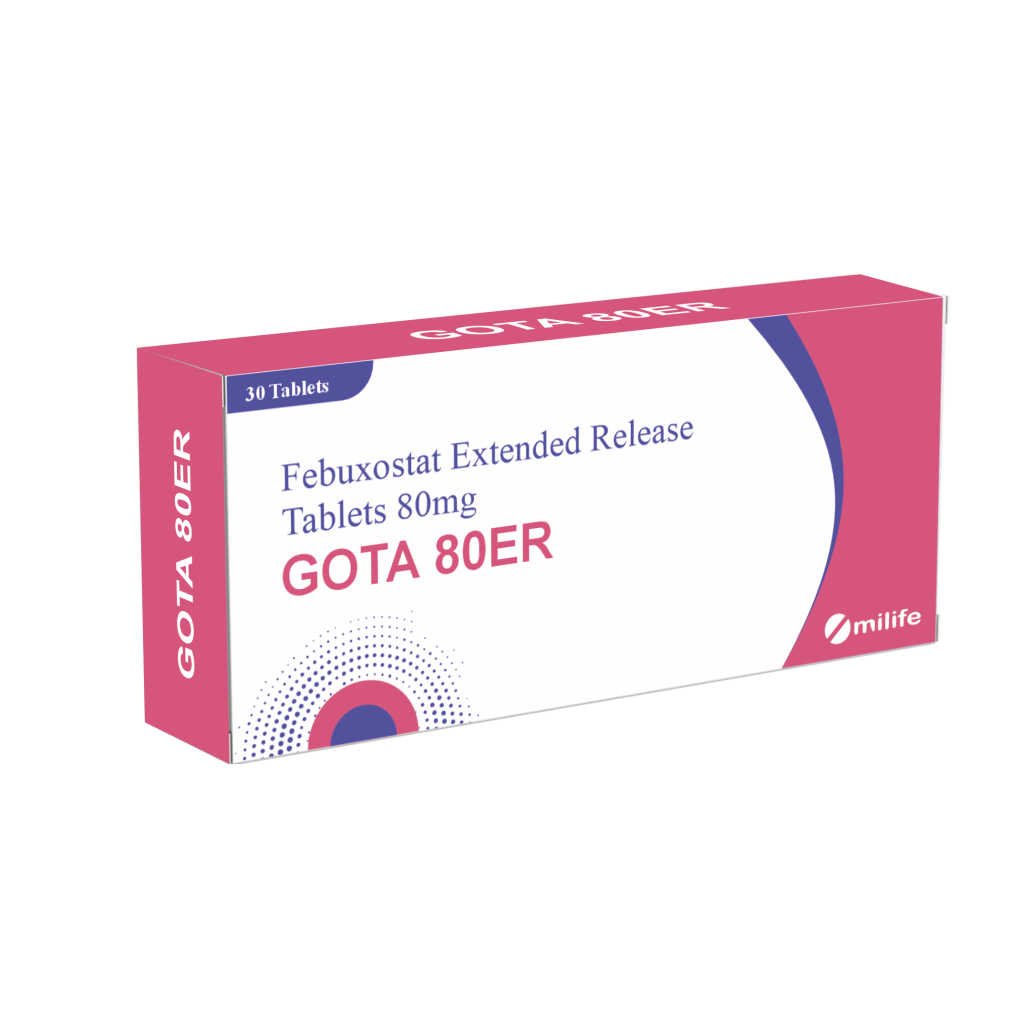
Febuxostat 80 mg Extended Release Tablets use for Treatment of chronic hyperuricaemia in conditions where urate deposition has already occurred (including a history, or presence of, tophus and/or gouty arthritis). Febuxostat Tablets is indicated in adults.
Gout: The recommended oral dose of Febuxostat is 40 mg once or twice daily without regard to food. If serum uric acid is > 6 mg/dL (357 μmol/L) after 2-4 weeks, Febuxostat 120 mg daily may be considered. Febuxostat Tablets works sufficiently quickly to allow retesting of the serum uric acid after 2 weeks. The therapeutic target is to decrease and maintain serum uric acid below 6 mg/dL (357 μmol/L). Gout flare prophylaxis of at least 6 months is recommended. Elderly: No dose adjustment is required in the elderly Renal impairment: The efficacy and safety have not been fully evaluated in patients with severe renal impairment (creatinine clearance < 30 mL/min). No dose adjustment is necessary in patients with mild or moderate renal impairment. Hepatic impairment: The efficacy and safety of febuxostat have not been studied in patients with severe hepatic impairment (Child-Pugh Class C). The recommended dose in patients with mild hepatic impairment is 80 mg. Limited information is available in patients with moderate hepatic impairment. Paediatric population: The safety and efficacy of Febuxostat Tablets in children aged below the age of 18 years have not been established. No data are available.
Gout flares, Uncommon: Diabetes mellitus, hyperlipidemia, decrease appetite, weight increase, Headache, Uncommon: Dizziness, paraesthesia, hemiparesis, somnolence, altered taste, hypoaesthesia, hyposmia, Diarrhoea, nausea, Uncommon: Abdominal pain, abdominal distension, gastrooesophageal reflux disease, vomiting, dry mouth, dyspepsia, constipation, frequent stools, flatulence, gastrointestinal discomfort, Rare: Pancreatitis, mouth ulceration. Rash (including various types of rash reported with lower frequencies), Uncommon: Dermatitis, urticaria, pruritus, skin discolouration, skin lesion, petechiae, rash macular, rash maculopapular, rash popular, Rare: Toxic epidermal necrolysis, Stevens-Johnson Syndrome, angioedema, drug reaction with eosinophilia and systemic symptoms, generalized rash (serious), erythema, exfoliative rash, rash follicular, rash vesicular, rash pustular, rash pruritic, rash erythematous, rash morbillifom, alopecia, hyperhidrosis
Cardio-vascular disorders Treatment of chronic hyperuricaemia Treatment with febuxostat in patients with ischaemic heart disease or congestive heart failure is not recommended. Medicinal product allergy / hypersensitivity Rare serious allergic/hypersensitivity reactions, including life-threatening Stevens-Johnson Syndrome, Toxic epidermal necrolysis and acute anaphylactic reaction/shock, have been reported. Patients should be advised of the signs and symptoms and monitored closely for symptoms of allergic/hypersensitivity reactions. Febuxostat treatment should be immediately stopped if serious allergic/hypersensitivity reactions, including Stevens-Johnson Syndrome, occur since early withdrawal is associated with a better prognosis and febuxostat must not be re-started in this patient at any time. Acute gouty attacks (gout flare) Febuxostat treatment should not be started until an acute attack of gout has completely subsided. Gout flares may occur during initiation of treatment due to changing serum uric acid levels resulting in mobilization of urate from tissue deposits. At treatment initiation with febuxostat flare prophylaxis for at least 6 months with an NSAID or colchicine is recommended. If a gout flare occurs during febuxostat treatment, it should not be discontinued. The gout flare should be managed concurrently as appropriate for the individual patient. Continuous treatment with febuxostat decreases frequency and intensity of gout flares. Xanthine deposition As there has been no experience with febuxostat, its use in patients with Lesch-Nyhan Syndrome isnot recommended. Mercaptopurine/azathioprine Febuxostat use is not recommended in patients concomitantly treated with mercaptopurine/ azathioprine as inhibition of xanthine oxidase by febuxostat may cause increased plasma concentrations of mercaptopurine/azathioprine that could result in severe toxicity. Liver disorders During the combined phase 3 clinical studies, mild liver function test abnormalities were observed in patients treated with febuxostat (5.0 %). Liver function test is recommended prior to the initiation of therapy with febuxostat and periodically thereafter based on clinical judgment. Thyroid disorders Increased TSH values (> 5.5 μIU/mL) were observed in patients on long-term treatment with febuxostat (5.5 %) in the long term open label extension studies. Caution is required when febuxostat is used in patients with alteration of thyroid function. Organ transplant recipients As there has been no experience in organ transplant recipients, the use of febuxostat in such patients is not recommended. Lactose Febuxostat Tablets contain lactose. Patients with rare hereditary problems of galactose intolerance, total lactase deficiency or glucose-galactose malabsorption should not take this medicinal product.
Store below 30°C. Protect from light and moisture. Keep out of reach of children.
3 x 10 Alu/PVC blister pack Febuxostat Extended Release Tablets ( GOTA 80ER) is available in an Alu/PVC blister of 10 tablets. Such 03 blisters in a unit carton with package insert.
Contact us directly to receive full information on the product, the formulation, the science behind it, stability data, and more. Our Business Development Manager is a click away.
Conical Pharmaceuticals is a professionally managed and dynamic organization with decades of experience in the pharmaceutical field. With a desire of providing opportunities for a better life, we work very hard to bring quality drugs to our customers. We have instilled a level of trust and confidence amongst our clients by supplying the best quality products.